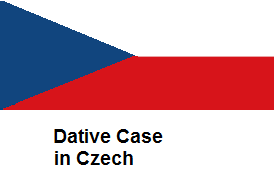Difference between revisions of "Language/Czech/Grammar/Dative-Case-in-Czech"
| Line 2: | Line 2: | ||
[[File:Dative Case in Czech.png|alt=Dative Case in Czech|thumb]] | [[File:Dative Case in Czech.png|alt=Dative Case in Czech|thumb]] | ||
==How to use the Dative Case in Czech== | ==How to use the Dative Case in Czech== | ||
The dative case is one of the six cases in the Czech language. It is used to indicate the indirect object of a sentence, as well as the recipient of an action. Here's what you need to know about using the dative case in Czech: | |||
=== Indirect object === | |||
In Czech, the dative case is used to indicate the indirect object of a sentence. The indirect object is usually the person or thing that receives the direct object. For example: | |||
* Daruji peníze synovi. (I am giving money to my son.) - The dative form of "syn" (son) is "synovi" to indicate that he is the recipient of the money. | |||
=== Recipient === | |||
The dative case is also used to indicate the recipient of an action. This is often used with verbs like "dát" (give), "pomoci" (help), and "odeslat" (send). For example: | |||
* Poslal jsem dopis své babičce. (I sent a letter to my grandmother.) - The dative form of "babička" (grandmother) is "babičce" to indicate that she is the recipient of the letter. | |||
=== Prepositions === | |||
Certain prepositions in Czech take the dative case. These include "k" (to), "ke" (to/towards), "do" (into), and "pro" (for). For example: | |||
* Jdu do kina. (I am going to the cinema.) - The dative form of "kino" (cinema) is "kinu" to indicate motion towards the cinema. | |||
=== Adjectives === | |||
Some adjectives in Czech take the dative case when used to describe the noun they modify. These include adjectives like "pomocný" (helpful) and "blízký" (close). For example: | |||
* Dávám peníze pomoci chudým lidem. (I am giving money to help poor people.) - The dative form of "lidé" (people) is "lidem" to indicate that they are the recipients of the help. | |||
Remember that the dative case in Czech must agree in gender and number with the noun it modifies. With these rules and some practice, you'll be able to use the dative case in Czech with ease! | |||
==Exampoles: HRAD (CASTLE)== | ==Exampoles: HRAD (CASTLE)== | ||
Revision as of 00:20, 18 February 2023
How to use the Dative Case in Czech
The dative case is one of the six cases in the Czech language. It is used to indicate the indirect object of a sentence, as well as the recipient of an action. Here's what you need to know about using the dative case in Czech:
Indirect object
In Czech, the dative case is used to indicate the indirect object of a sentence. The indirect object is usually the person or thing that receives the direct object. For example:
- Daruji peníze synovi. (I am giving money to my son.) - The dative form of "syn" (son) is "synovi" to indicate that he is the recipient of the money.
Recipient
The dative case is also used to indicate the recipient of an action. This is often used with verbs like "dát" (give), "pomoci" (help), and "odeslat" (send). For example:
- Poslal jsem dopis své babičce. (I sent a letter to my grandmother.) - The dative form of "babička" (grandmother) is "babičce" to indicate that she is the recipient of the letter.
Prepositions
Certain prepositions in Czech take the dative case. These include "k" (to), "ke" (to/towards), "do" (into), and "pro" (for). For example:
- Jdu do kina. (I am going to the cinema.) - The dative form of "kino" (cinema) is "kinu" to indicate motion towards the cinema.
Adjectives
Some adjectives in Czech take the dative case when used to describe the noun they modify. These include adjectives like "pomocný" (helpful) and "blízký" (close). For example:
- Dávám peníze pomoci chudým lidem. (I am giving money to help poor people.) - The dative form of "lidé" (people) is "lidem" to indicate that they are the recipients of the help.
Remember that the dative case in Czech must agree in gender and number with the noun it modifies. With these rules and some practice, you'll be able to use the dative case in Czech with ease!
Exampoles: HRAD (CASTLE)
Singular
I GO TO THE CASTLE
JÁ JDU K HRADU
Plural
WE GO TO THE CASTLES
MY JDEME K HRADŮM
ŠKOLA / SCHOOL / ESCOLA
Singular
I GO TO THE SCHOOL
JÁ JDU K ŠKOLĚ
Plural
WE GO TO THE SCHOOLS
MY JDEME K ŠKOLÁM
AUTO / CAR / CARRO
Singular
I GO TO THE CAR
JÁ JDU K AUTU
Plural
WE GO TO THE CARS
MY JDEME K AUTŮM
